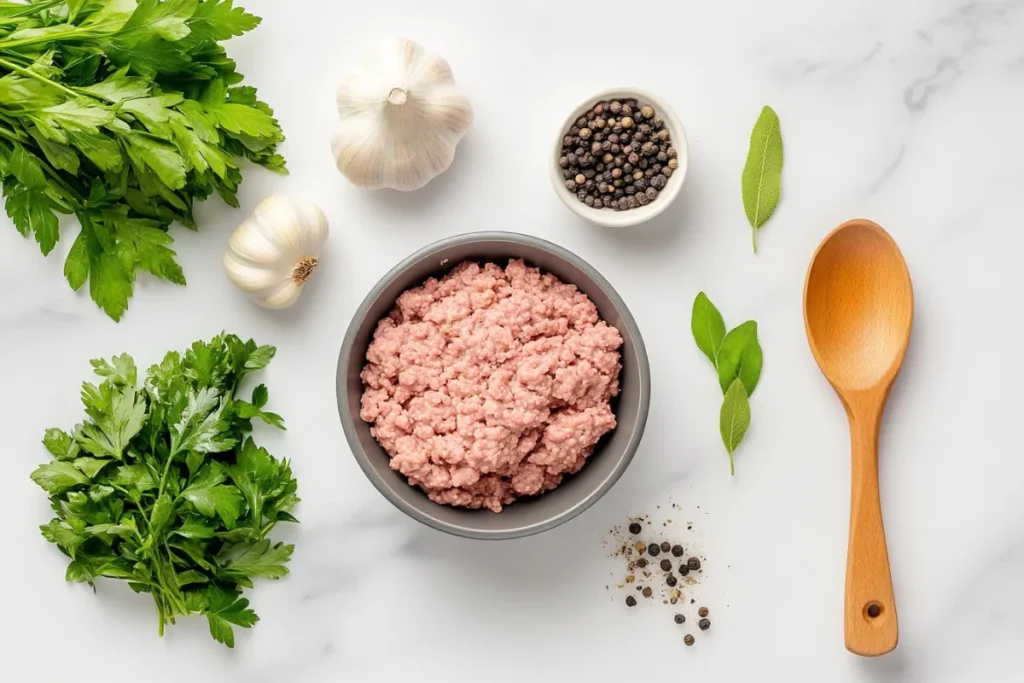Is turkey sausage actually healthy? This is a question many people ask when looking for a leaner, healthier alternative to traditional Turkey sausage. Known for its lower fat content and high protein, turkey sausage has become a popular choice among health-conscious eaters. But is it truly the healthier option, or are there hidden drawbacks?
In this article, we’ll dive deep into the nutritional profile, health benefits, and potential downsides of turkey sausage. We’ll also explore tips for choosing the healthiest options and answer common questions about this versatile protein. Let’s uncover the truth about turkey sausage!
Let’s start by understanding what turkey sausage really is and how it’s made!
Understanding Turkey Sausage
What is Turkey Sausage?
Turkey sausage is a type of sausage made primarily from ground turkey. It’s seasoned with various spices and herbs to create flavors similar to traditional Turkey sausage. Whether you buy it in links, patties, or as ground turkey sausage, it’s a versatile ingredient that can be used in breakfast dishes, pasta, soups, and more.
One thing that makes turkey sausage stand out is its reputation as a healthier alternative. Its leaner meat content means fewer calories and less fat, which appeals to those trying to maintain a balanced diet without sacrificing flavor.
How Turkey Sausage is Made
So, how is turkey sausage actually made? Most store-bought versions start with ground turkey, which is blended with seasonings like sage, black pepper, garlic powder, and paprika. Some versions also contain binding agents like breadcrumbs or eggs to maintain the sausage’s shape and texture.
The production process depends on the type of turkey sausage. Fresh turkey sausage is raw and must be cooked before eating, while pre-cooked options are fully cooked and just need reheating. Smoked varieties go through an additional smoking process for added flavor.
What Makes Turkey Sausage Different from Turkey Sausage?
When comparing turkey sausage to Turkey sausage, the differences are clear. The most obvious distinction lies in the meat source—turkey sausage is made from leaner turkey meat, while Turkey sausage comes from fattier cuts of Turkey.
Nutritionally, turkey sausage often contains less fat and fewer calories. However, the taste can differ slightly due to the leaner meat. Turkey sausage has a richer, fattier flavor, while turkey sausage has a lighter, milder profile that pairs well with various seasonings.
Turkey sausage is also more adaptable for people with dietary restrictions. It’s often available in nitrate-free, low-sodium, and gluten-free versions, making it a better fit for heart-healthy or allergen-conscious diets.
Nutritional Profile of Turkey Sausage
Calories, Protein, and Fat in Turkey Sausage
When considering the question “Is turkey sausage actually healthy?”, understanding its nutritional profile is key. One of the standout benefits of turkey sausage is its leaner composition compared to traditional Turkey sausage. A single 2-ounce serving of turkey sausage typically contains:
- Calories: Around 100-140, depending on the brand and seasoning.
- Protein: A solid 10-12 grams, making it a great source of muscle-building protein.
- Fat: About 6-8 grams, with only 2-3 grams of saturated fat, far less than Turkey sausage.
This balance of calories, protein, and fat makes turkey sausage an excellent choice for those looking to reduce fat intake without sacrificing flavor. It’s especially helpful for individuals focused on maintaining a high-protein, low-fat diet, such as those following a weight loss or fitness plan.
Vitamins and Minerals Found in Turkey Sausage
Turkey sausage doesn’t just provide protein—it’s also rich in essential vitamins and minerals that support overall health:
- Vitamin B12: Important for energy production and red blood cell formation.
- Selenium: A powerful antioxidant that helps protect cells from damage.
- Zinc: Supports immune health and wound healing.
Including turkey sausage in your meals is a simple way to boost your intake of these nutrients, particularly for individuals with meat-based diets. However, be mindful of the sodium levels in pre-packaged varieties, as some can be high in salt.
Comparison with Other Sausage Types (Turkey , Chicken, Plant-Based)
How does turkey sausage compare to its alternatives?
- Turkey Sausage: Higher in fat and calories, with roughly 170-200 calories and 15-20 grams of fat per serving. Turkey sausage wins for those aiming to cut back on saturated fat.
- Chicken Sausage: Very similar to turkey sausage in terms of calories and protein, but chicken sausage sometimes has higher sodium levels.
- Plant-Based Sausages: These are cholesterol-free and often lower in fat, but they lack the high-quality protein found in turkey sausage.
If you’re looking for a lean, protein-rich option, turkey sausage often strikes the best balance between nutrition and flavor.
Health Benefits of Turkey Sausage
Lower Fat Content and Weight Management
One of the main reasons people ask “Is turkey sausage actually healthy?” is because of its lower fat content. Turkey sausage has significantly less saturated fat than Turkey sausage, which makes it a heart-friendly choice. Consuming less saturated fat can help reduce LDL (bad) cholesterol levels and lower the risk of heart disease.
Additionally, turkey sausage’s lean composition supports weight management goals. Its high protein content helps you feel full for longer, reducing the urge to snack or overeat throughout the day. Swapping Turkey sausage for turkey sausage is a small change that can make a big difference in your calorie and fat intake over time.
High Protein for Muscle Growth and Recovery
Protein is essential for building and repairing muscles, and turkey sausage provides a hefty dose. With 10-12 grams of protein per serving, it’s a great addition to breakfast, lunch, or dinner for active individuals or those looking to maintain muscle mass.
Pairing turkey sausage with other high-protein foods, such as eggs or legumes, can further amplify its benefits. This combination is particularly useful for athletes or anyone recovering from intense workouts, as protein aids in muscle recovery and reduces soreness.
Heart-Healthy Benefits of Lean Turkey Sausage
Turkey sausage is often considered a better option for heart health compared to Turkey or beef sausages. Its lower levels of saturated fat and cholesterol make it a smarter choice for those managing heart conditions or simply aiming to improve cardiovascular health.
Additionally, turkey sausage contains selenium and zinc, which are essential for reducing inflammation and supporting immune health—both of which contribute to overall heart wellness.
Part 4: Potential Downsides of Turkey Sausage (300 Words)

Added Sodium and Preservatives
While turkey sausage is often marketed as a healthier option, one potential downside is its sodium content. Many pre-packaged turkey sausages are high in salt to enhance flavor and extend shelf life. Consuming too much sodium can lead to health issues like high blood pressure and an increased risk of heart disease.
In addition to sodium, some turkey sausages contain preservatives such as nitrates or nitrites. These additives are used to improve texture, color, and longevity, but studies suggest that consuming processed meats with nitrates may have negative long-term health effects. If you’re asking yourself, “Is turkey sausage actually healthy?”, the answer depends on choosing options with fewer additives and lower sodium levels.
Impact of Processed Meat on Health
Turkey sausage is still classified as a processed meat, which raises some concerns. Processing often involves curing, smoking, or adding preservatives, and over time, a diet high in processed meats may increase the risk of certain cancers and chronic illnesses.
That said, not all turkey sausages are created equal. Some brands prioritize healthier production methods by avoiding harmful additives. Choosing nitrate-free or minimally processed turkey sausage can help mitigate these risks while still enjoying the benefits of a lean protein source.
Allergy Risks and Hidden Ingredients
Another potential drawback of turkey sausage is the inclusion of hidden ingredients. Some brands add fillers, such as wheat or soy, which could pose problems for people with allergies or dietary restrictions. Always read the ingredient label carefully to ensure the product aligns with your health and dietary needs.
If you’re worried about hidden additives, homemade turkey sausage is a fantastic way to control the ingredients while still enjoying this versatile food. For more recipe ideas, check out our easy chicken recipes for dinner for inspiration.
How to Choose Healthy Turkey Sausage
What to Look for on Nutrition Labels
When trying to determine “Is turkey sausage actually healthy?”, the answer often lies in the nutrition label. Start by looking at the fat, sodium, and calorie content. Aim for options with:
- Low Sodium: Look for sausages with less than 400 mg of sodium per serving.
- High Protein: Opt for sausages with at least 10 grams of protein per serving to maximize its nutritional value.
- Minimal Additives: Avoid products with long ingredient lists filled with artificial preservatives, nitrates, or fillers.
Nutrition labels can be a helpful tool to identify the healthiest options available in stores.
Nitrate-Free and Organic Turkey Sausage Options
If you’re focused on choosing the healthiest turkey sausage, look for nitrate-free or organic options. These sausages are often made with fewer preservatives and use natural ingredients instead. Organic varieties also ensure the turkey was raised without antibiotics or hormones, which is an added bonus for health-conscious shoppers.
Brands like Applegate and Bilinski’s are known for offering organic and nitrate-free turkey sausage, making them a reliable choice.
Low-Sodium and Gluten-Free Brands
For those with dietary restrictions, low-sodium and gluten-free turkey sausage options are widely available. These products cater to people watching their salt intake or avoiding gluten due to allergies or intolerances.
If you’re unsure where to start, check for turkey sausage brands that clearly label their products as “heart-healthy” or “gluten-free” on the packaging. These labels can save you time when shopping and ensure you’re making a better choice for your health.
Cooking with Turkey Sausage: Healthy Meal Ideas
Breakfast Recipes Using Turkey Sausage
Incorporating turkey sausage into breakfast is a smart way to start your day with a boost of protein while keeping it light and nutritious. If you’re wondering, “Is turkey sausage actually healthy?”, the answer is yes—when used in balanced meals like these:
- Turkey Sausage and Egg Scramble: Cook turkey sausage crumbles with scrambled eggs, spinach, and tomatoes for a quick, flavorful breakfast bowl.
- Turkey Sausage Breakfast Burrito: Wrap cooked turkey sausage, scrambled eggs, shredded cheese, and avocado in a whole-wheat tortilla for a satisfying, on-the-go meal.
- Healthy Breakfast Casserole: Layer turkey sausage, diced sweet potatoes, and egg whites in a baking dish and bake until set for a hearty, make-ahead breakfast option.

Lunch and Dinner Dishes Featuring Turkey Sausage
Turkey sausage isn’t limited to morning meals—it’s versatile enough to star in lunch and dinner recipes too! Here are some ideas to inspire your next healthy meal:
- Turkey Sausage and Veggie Skillet: Sauté turkey sausage with zucchini, bell peppers, and onions in olive oil. Sprinkle with fresh herbs for a one-pan, nutrient-packed dinner.
- Stuffed Bell Peppers with Turkey Sausage: Mix turkey sausage with cooked quinoa, black beans, and diced tomatoes, then bake the filling in halved bell peppers for a colorful and healthy dinner.
- Turkey Sausage Pasta: Toss whole-grain pasta with turkey sausage, marinara sauce, and steamed broccoli for a comforting yet balanced meal.
Replacing fattier meats with turkey sausage in your favorite dishes not only lightens the calorie load but also adds lean protein to keep you full longer.
How to Substitute Turkey Sausage in Your Favorite Recipes
When you’re experimenting in the kitchen, turkey sausage is an easy swap for other sausage types in recipes like soups, casseroles, or stir-fries. Try using turkey sausage in gumbo or jambalaya to reduce fat while keeping the rich, spiced flavors intact.
For more meal ideas, explore our easy chicken recipes for dinner, where turkey sausage can serve as a lean alternative to heavier meats.
FAQs About Turkey Sausage
What is Turkey Sausage Made Out Of?
Turkey sausage is primarily made from ground turkey meat. It’s blended with spices like sage, garlic, black pepper, and paprika to replicate the bold flavors of traditional sausages. Some products may also include binding agents like breadcrumbs or eggs to hold the sausage together.
Is Turkey Sausage Still Turkey?
No, turkey sausage is not Turkey. It’s made entirely from turkey meat, making it a leaner option compared to Turkey sausage. That said, some turkey sausage products may include small amounts of Turkey for flavoring, so always check the ingredient label if you’re aiming for a 100% turkey product.
Is Turkey Sausage 100% Turkey?
Not all turkey sausage is made from pure turkey meat. Some brands add fillers, preservatives, or flavorings that might not align with your dietary preferences. Look for labels that clearly state “100% turkey” or “all-natural” to ensure you’re getting a cleaner, healthier product.
Does Turkey Sausage Contain Additives or Preservatives?
Yes, many commercial turkey sausages contain additives like nitrates, nitrites, or artificial flavorings. These preservatives extend shelf life but may raise health concerns when consumed in large amounts. For a healthier alternative, opt for nitrate-free turkey sausage or consider making your own at home to avoid unnecessary additives.
These FAQs help clarify common questions and guide readers wondering, “Is turkey sausage actually healthy?” Knowing what’s in your sausage can make a big difference when choosing the best option for your health.
Final Thoughts: Is Turkey Sausage a Healthy Choice?
The Pros of Including Turkey Sausage in Your Diet
So, is turkey sausage actually healthy? The answer largely depends on how it’s prepared and consumed. Turkey sausage is a leaner, high-protein alternative to traditional Turkey sausage, making it an excellent choice for those aiming to cut back on fat and calories. Additionally, it provides essential nutrients like B vitamins and selenium, which contribute to energy production and immune health.
When enjoyed as part of a balanced diet, turkey sausage can be a versatile and nutritious option. It works well in various meals, from breakfast bowls to dinner pastas, offering a healthier twist without sacrificing flavor.
When to Avoid Turkey Sausage
Despite its benefits, not all turkey sausage is created equal. Processed varieties often contain high levels of sodium, preservatives, or hidden additives, which may outweigh its nutritional perks. If you’re managing conditions like high blood pressure or prefer clean eating, it’s essential to choose options labeled as nitrate-free, low-sodium, or organic.
If you’re wondering, “Is turkey sausage actually healthy?”, the key lies in moderation and making informed choices. Opt for minimally processed products, and try pairing them with fresh vegetables, whole grains, or eggs for a complete and balanced meal.
Balancing Turkey Sausage with Whole, Fresh Foods
To maximize its health benefits, combine turkey sausage with whole, nutrient-dense foods like leafy greens, quinoa, or sweet potatoes. By doing so, you create meals that support your overall wellness while still satisfying your taste buds.
In Part 9, we’ll explore actionable tips for incorporating turkey sausage into your meal plan while addressing key takeaways from this guide.
Tips for Incorporating Turkey Sausage into Your Diet
Keep It Balanced with Nutrient-Rich Ingredients
If you love turkey sausage but want to ensure it fits into a healthy lifestyle, focus on pairing it with nutrient-rich ingredients. For example:
- Serve turkey sausage with roasted vegetables for a low-carb dinner.
- Add turkey sausage to quinoa or whole-grain pasta to balance protein and fiber.
- Use turkey sausage in soups or stews with beans and leafy greens for a hearty, wholesome meal.
The key is to use turkey sausage as a complement to fresh, whole foods rather than relying on it as the main ingredient in every meal.
Experiment with Homemade Options
Making your own turkey sausage is a game-changer for health-conscious eaters. By combining ground turkey with your choice of herbs and spices, you can avoid preservatives, control sodium levels, and customize the flavor. Homemade turkey sausage patties are perfect for breakfast, while crumbled turkey sausage works wonders in pasta dishes or casseroles.
When to Choose Store-Bought Sausage
Sometimes convenience wins! When buying turkey sausage, look for products labeled as “nitrate-free,” “organic,” or “low-sodium” to minimize potential downsides. Stick to brands that prioritize clean ingredients and avoid fillers or artificial additives.
By following these tips, you can enjoy the versatility of turkey sausage while staying true to your health goals. Whether homemade or store-bought, it can be a valuable addition to your diet when chosen wisely.
Everything You Need to Know About Turkey Sausage: Delicious Recipes, Benefits, and More

